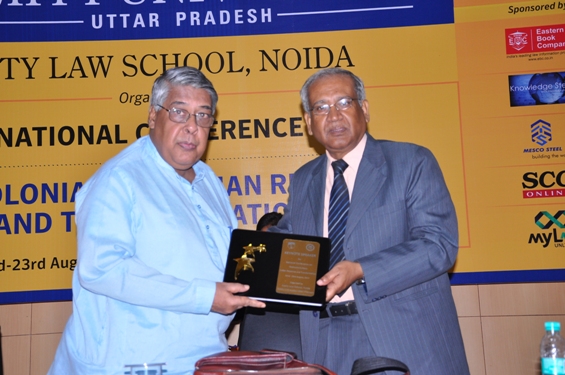22 Aug 2017|Noida | Amity University Campus, Sector-125, Noida
National Conference on Post Colonialism: Indian Response and Transformation started by Amity law School, Noida

Amity Law School, Noida started two days National Conference on "Post Colonialism: Indian Response and Transformation" at University Campus, Sector-125, Noida
Dr. Kavita Sharma, President, SAU; Prof. Purushottam Aggarwal, Member, UPSC and Prof. Nuzhat Praveen Khan, Dean, School of Law, Jamia, Prof. (Dr.) D.K. Bandyopadhyay,Chairman, Amity Law Schools and Prof. (Dr.) Aditya Tomar Addl. Director, Amity Law School, Noida inaugurated the Conference.
Welcoming distinguished gathering, Dr. Shefali Raizada- Addl. Director, Amity Law School, Noida expressed that the Conference has been organized on a relevant and thought provoking topic. She stressed that although the focus, now-a days,is on socio-economic development of the country but values cannot be ignored atthe same time. She shared that the scope of the Conference will extend to the topics which directly or indirectly, have nexus with law and impact society.She expressed her hope that the Conference will lead to fruitful discussions and enrich the knowledge of the participants.
Addressing the gathering, Dr.Kavita Sharma, President, South Asian Universities (SAU) stressed that no transformation is possible without education in any nation. She shared that earlier Education was a Directive Principle and it became part of Constitution during the freedom of India. She lamented that even after independence, colonial pattern of education continued in India. She stressed that Right to Education Act was passed in 2005 but even now, over 6.3 crore children of school going age are out of schools. After so many years, the complete implementation of RTE is still awaited. She opined that in addition to free education, free uniform and free meals, delivery systems need to be streamlined and the community needs to be mobilized to send their children to school.
Sharing his views on the topic of the Conference, Prof. Purushottam Aggarwal, Member, UPSC stated that unlike colonial belief, India was not a stagnant economy when it came in touch with colonialism; in fact, it became stagnant during colonization. British Government policies led to deliberate starvation of people, something similar to Victorian Holocaust. “Our freedom struggle was not only political movement but moral re-surgence of colonial world. It is easy to criticize everything and dismiss the progress witnessed during last 70 years. Developmental parameters such as Average Life Expectancy and Per Capita Income per person has improved drastically since independence. He called upon the students to understand the importance of freedom and stressed that India is an ancient civilization and young nation with rich cultural diversity. He averred that challenges are there and they need to be faced at the same time, Indians have a legacy and capacity to transform the great civilization.
Prof. Nuzhat PraveenKhan, Dean, School of Law, Jamia, while sharing her views during the occasion, stated that education level and condition of women determine the level of a country. She stressed that post-independence,Indian Constitution empowered women through special provisions; Parliament passed many laws and regulations such as Domestic Violence Act, Maternity Act, and Dowry Act etc. Expressing her concern, she stated that despite of all such measures, women are still unsafe and insecure in India. As per Global Gender Index, India is not doing enough for its women. She encouraged budding lawyers to pick up cudgels and be the custodians of the rights and privileges of the women in India.